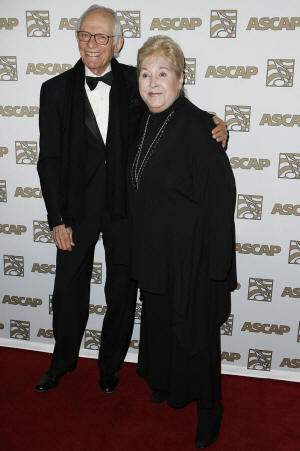Alan Bergman, Oscar-winning lyricist who helped write 'The Way We Were,'
dies at 99
[July 19, 2025]
By HILLEL ITALIE
Alan Bergman, the Oscar-winning lyricist who teamed with his wife,
Marilyn, for an enduring and loving partnership that produced such
old-fashioned hits as “How Do You Keep the Music Playing?,” “It Might Be
You” and the classic “The Way We Were,” has died at 99.
Bergman died late Thursday at his home in Los Angeles, family
spokesperson Ken Sunshine said in a statement Friday. The statement said
Bergman had, in recent months, suffered from respiratory issues “but
continued to write songs till the very end.”
The Bergmans married in 1958 and remained together until her death, in
2022. With collaborators ranging from Marvin Hamlisch and Quincy Jones
to Michel Legrand and Cy Coleman, they were among the most successful
and prolific partnerships of their time, providing words and occasional
music for hundreds of songs, including movie themes that became as
famous as the films themselves. Frank Sinatra, Michael Jackson, Tony
Bennett and many other artists performed their material, and Barbra
Streisand became a frequent collaborator and close friend.
Sunshine said that there will still be a centennial celebration of Alan
Bergman as planned at Santa Monica's Broad Stage, with guests including
Michael Feinstein, Jackson Browne and Patti Austin. Feinstein, among the
many artists who posted tributes Friday, wrote that the Bergmans were
“kind, talented and principled artists” who “lived from a place called
Love.”
Blending Tin Pan Alley sentiment and contemporary pop, the Bergmans
crafted lyrics known by millions, many of whom would not have recognized
the writers had they walked right past them. Among their most famous
works: the Streisand-Neil Diamond duet “You Don’t Bring Me Flowers,” the
well-named Sinatra favorite “Nice ’n’ Easy” and the topical themes to
the 1970s sitcoms “Maude” and “Good Times.” Their film compositions
included Ray Charles’ “In the Heat of the Night” from the movie of the
same name; Noel Harrison’s “The Windmills of Your Mind,” from “The
Thomas Crown Affair”; and Stephen Bishop’s “It Might Be You,” from
“Tootsie.”

The whole world seemed to sing and cry along to “The Way We Were,” an
instant favorite recorded by Streisand for the 1973 romantic drama of
the same name that co-starred Streisand and Robert Redford. Set to
Hamlisch’s tender, bittersweet melody, it was essentially a song about
itself — a nostalgic ballad about nostalgia, an indelible ode to the
uncertainty of the past, starting with one of history’s most famous
opening stanzas: “Memories / light the corners of my mind / misty
watercolor memories / of the way we were.”
“The Way We Were” was the top-selling song of 1974 and brought the
Bergmans one of their three Oscars, the others coming for “Windmills of
Your Mind” and the soundtrack to “Yentl,” the Streisand-directed movie
from 1983. At times, the Academy Awards could be mistaken for a Bergman
showcase. In 1983, three of the nominees for best song featured lyrics
by the Bergmans, who received 16 nominations in all.

[to top of second column]
|

Honorees Alan, left, and Marilyn Bergman arrive at the ASCAP Film
and Television music awards in Beverly Hills, Calif. on Tuesday, May
6, 2008. (AP Photo/Matt Sayles, File)
 The Bergmans also won two Grammys,
four Emmys, were presented numerous lifetime achievement honors and
received tributes from individual artists, including Streisand’s
2011 album of Bergman songs, “What Matters Most.” On “Lyrically,
Alan Bergman,” Bergman handled the vocals himself. Although best
known for their movie work, the Bergmans wrote the Broadway musical
“Ballroom” and provided lyrics for the symphony “Visions of
America.”
Their very lives seemed to rhyme. They didn’t meet until they were
adults, but were born in the same Brooklyn hospital, four years
apart; raised in the same Brooklyn neighborhood, attended the same
children’s concerts at Carnegie Hall and moved to California in the
same year, 1950. They were introduced in Los Angeles while working
for the same composer, but at different times of the day. Their
actual courtship was in part a story of music. Fred Astaire was
Marilyn’s favorite singer at the time and Alan Bergman co-wrote a
song, “That Face,” which Astaire agreed to record. Acetate in hand,
Bergman rushed home to tell Marilyn the news, then proposed.
Bergman is survived by a daughter, Julie Bergman, and granddaughter.
Bergman had wanted to be a songwriter since he was a boy. He majored
in music and theater at the University of North Carolina, and
received a master’s from the University of California, Los Angeles,
where he befriended Johnny Mercer and became a protege. He and
Marilyn at first wrote children’s songs together, and broke through
commercially in the late 1950s with the calypso hit “Yellowbird.”
Their friendship with Streisand began soon after, when they visited
her backstage during one of her early New York club appearances. “Do
you know how wonderful you are?” was how Marilyn Bergman greeted the
young singer.
The Bergmans worked so closely together that they often found
themselves coming up with the same word at the same time. Alan
likened their partnership to housework: one washes, one dries, the
title of a song they eventually devised for a Hamlisch melody.
Bergman was reluctant to name a favorite song, but cited “A Love
Like Ours” as among their most personal:
“When love like ours arrives / We guard it with our lives / Whatever
goes astray / When a rainy day comes around / A love like ours will
keep us safe and sound.”
All contents © copyright 2025 Associated Press. All rights reserved |